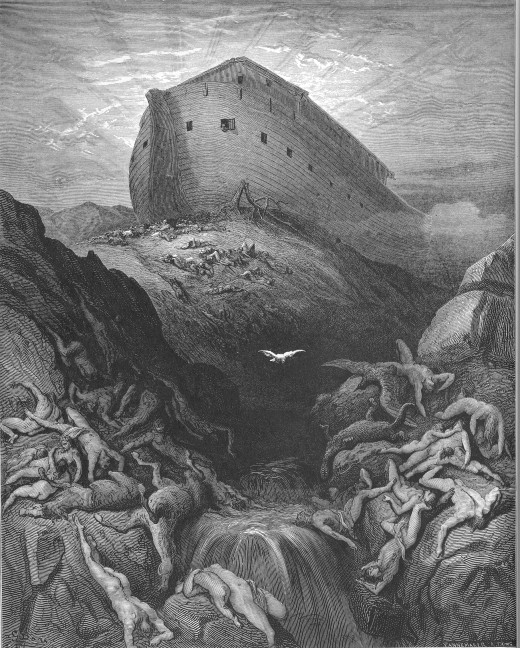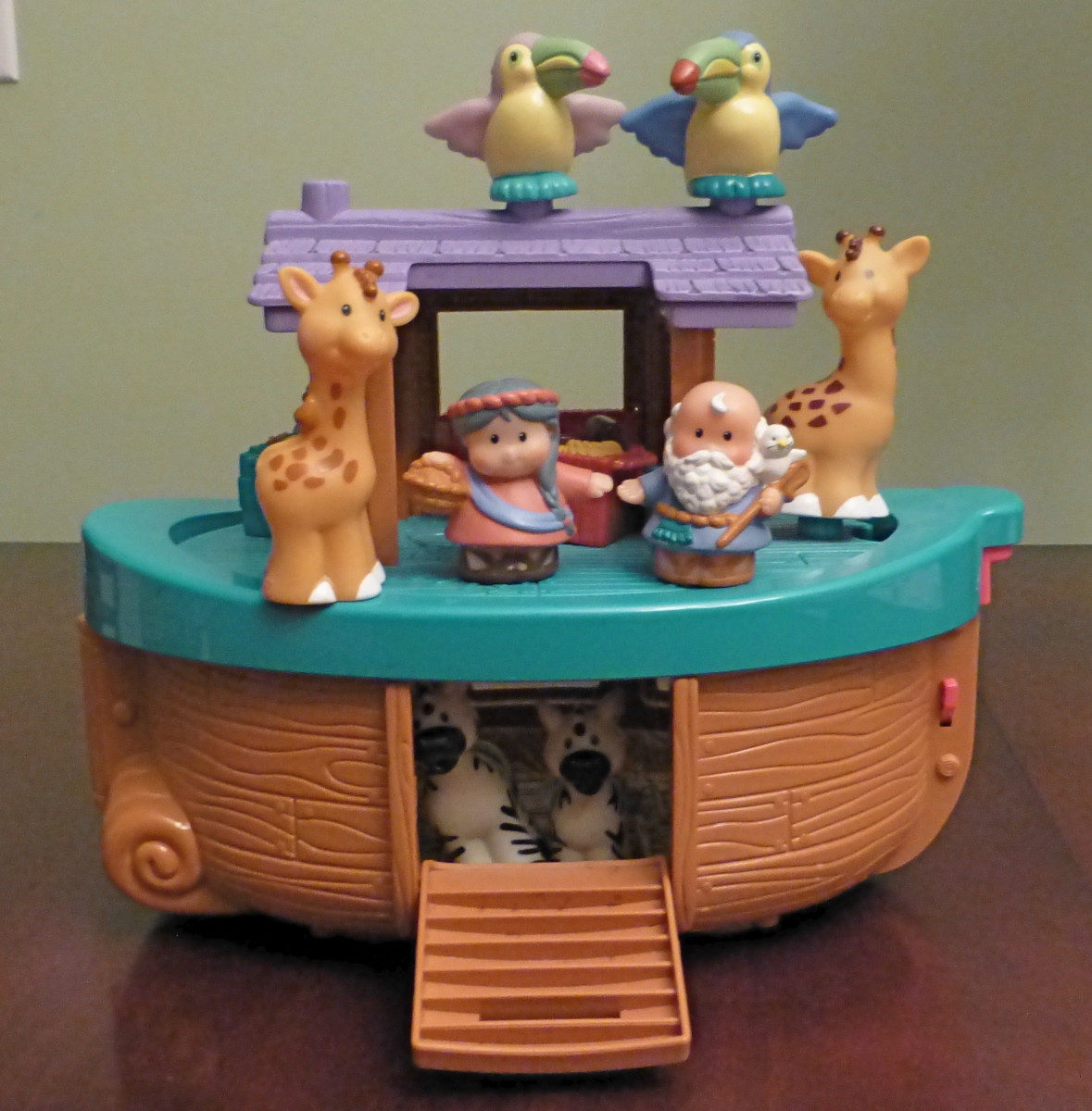The Burning Platform: No More Noah's Ark.

What is a burning platform?
A few years ago I read an article on the subject of business leadership in Canada. The author made the case that investment in business leadership development was woefully inadequate, and had been for some time. He described the net result as organisations being on a "burning platform".
Therefore, it was only a matter of time before disaster struck and everything would be lost.
I wholeheartedly agree. Having worked as an "agency worker" in Canada for several years I have come across some of the worst management and so-called "leadership" I have ever experienced in my 40+ years of work life.
But for me it is not just the lack of leadership development that is the "burning platform".
Rather, it is our total reliance on the principles of Scientific Management and our "efficiency is the only way" and "efficiency is the best way" mindset.
In this article I will set out the case for calling an end to the "efficiency is the best and only way" paradigm.
Our "burning platform" is the failure to transform our organisations into completely new and different entities that can meet the demands and challenges of the 21st-Century.

What does Noah's Ark represent?
Noah's Ark represents everything that has made us successful in the past, primarily:
- Hierarchy.
- Formal use of power and authority.
- Routine and mechanistic ways of working.
- Predominance of one-way communication.
However, it is the very things that have made us successful in the past that are now preventing us from being successful in the future. This is our burning platform.
I think this way for several reasons.
Our organisation's, built on the Noah's Ark paradigm, the efficiency "one best way" way of thinking, is designed for stability in a relatively stable environment.
Noah's Ark was a very simple construction of wood and pitch. To fulfill its purpose, all it had to do was keep people sheltered from the rain and then float on the rising waters.
The Ark had no communication, guidance or life-support systems and it had absolutely no power. It just drifted along, depending on providence for its final destination.
It has been well documented over many years now that organisations built like this find it virtually impossible to cope with the highly unstable and unpredictable environments of the 21st-Century. 60 years ago, the list of Fortune 500 companies did not change that much. Today, it is the total opposite.
Noah's Ark organisation's struggle with developing and using soft skills like communication, teamwork and problem solving because the efficiency mind set of the system does not readily facilitate use of these skills in the workplace.
Creativity and innovation are impossible.
Just a final thought on the power of Noah's Ark thinking. After the Industrial Revolution and the development of Scientific Management, this "Noah's Ark" paradigm was not only highly successful at creating wealth and well-paid jobs. It saved whole populations from poverty, starvation and death.
History is a powerful force in shaping current culture. Many millions of people today, together with our Political leaders, are looking back at the Noah's Ark paradigm to save us again.
But this is futile. Noah's Ark faced a flood, but today with our "burning platform" .... we face a fire!

What will make us successful in the future?
"Gestalt" is the concept, the belief system, that "the whole is greater than the sum of the individual parts". We can see this pictured in the Apollo spacecraft. Millions of individual components all fitted together in a way that provides us with a structure that is a paradigm shift away from Noah's Ark.
Relative to the Ark, the Apollo spacecraft has:
- Highly sophisticated communication, guidance and life support systems.
- Incredible power.
What the scientists, engineers and technicians did with the Apollo spacecraft was build something that once ready for launch became an almost autonomous work unit. What existed between Mission Control and the Apollo craft in space was a kind of "synergy" where "two are better than one".
The near catastrophic failure of Apollo 13 and the rescue plans developed by NASA based out of Houston give a perfect picture of what I have in mind here.
There are many more analogies connected with the Apollo spacecraft and the Apollo missions, but I will leave those for another time, suffice to say that it is learning from the lessons from the Apollo spacecraft that will make us successful in the future.
Organisations structured for versatility; the ability to change and adapt immediately to any given situation at any given time.
The Apollo spacecraft represents our future success; highly effective communication, highly effective guidance, highly effective staff support and an abundance of power to get things done.
In the future we need the ability to learn as naturally as breathing. The ability to overcome obstacles and achieve objectives effectively.


The efficiency and effectiveness paradigms contrasted.
Structure can be thought of as the way something is made or put together.
Purpose is what something is used for.
Quality is when something is fit for purpose.
Therefore, to assess the quality of an organisation we must look at its structure and purpose.
Structure must facilitate purpose otherwise effort becomes futile and time and money are wasted.
The relationship between structure and purpose, that is, how structure changes to facilitate purpose, can be clearly seen in bicycles. All bicycles have the same general idea behind them, but the structure (the design and arrangement of its constituent parts) varies according to purpose.
The two types of bikes I have in mind here are road race bikes (like those used in the Tour-de-France) and downhill race mountain bikes.
The road race bike is build for maximum efficiency. It's purpose is to convert the rider's muscle strength into forward motion as efficiently as possible on a highly stable and predictable surface.
On the other hand, the downhill bike is built for effectiveness. Its purpose is to enable the rider to gain and maintain control of the bike on a highly unstable and unpredictable surface.
To use the downhill bike in the Tour-de-France would be futile. To use the road race bike to come down a mountain might be suicidal.
Here's my conclusion. Organisation's that continue to use and rely on the Noah's Ark "efficiency" paradigm to try and perform in a highly unstable and unpredictable environment are running into big trouble. In may respects they are committing suicide.
Which paradigm is in use here?
The production line and the ant colony.
Transformation is not change. Transformation is a metamorphosis, like a tadpole becoming a frog or a caterpillar becoming a butterfly.
Therefore, anything that undergoes transformation ceases to exist.
An organisation that undergoes change is still recognisable in its original form. An organisation that undergoes transformation is not. All traces of its original form have gone, it has "metamorphosed" into a completely new and different entity.
If we want an organisation transformed our "efficiency" paradigm has to go. It must be metamorphosed into effectiveness
The differences I have in mind between efficiency and effectiveness are like the differences between a production line and an ant colony.
To the efficiency mindset, the ant colony looks like perfect chaos, yet ants are said to be one of the most successful species on the planet.
Ants have no leaders, rulers or overseers, yet each one knows exactly what to do at any given time in any given circumstance for the good of the whole.
The any colony gives us a picture of working:
- Without hierarchy.
- An absence of coercive power.
- No routine or mechanistic ways of working.
- Continuous dialogue.
But you might say, "that's impossible!". Well that's what might be said about a caterpillar becoming a butterfly, and it was most certainly said about men going to the Moon and returning safely to Earth.
Noah's Ark and the Apollo Spacecraft.
If Noah were alive today, the Ark would be of no use because the second death is by fire.
In the same way, organisations built on the efficiency paradigm will be of no use to us in the future. We are standing on a "burning platform".







